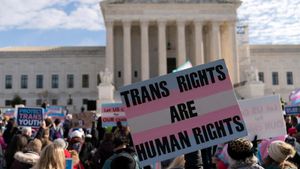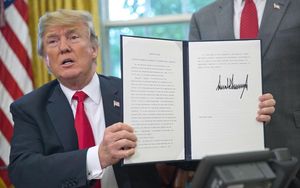The countdown for the dissolution order of the Unification Church, now known as the Family Federation for World Peace and Unification, has begun as the Tokyo District Court nears its decision. The court hearing, initiated by the Ministry of Education, has garnered significant attention amid various legal battles concerning the organization.
The dissolution request stems from allegations of coercive practices and financial misconduct associated with the church’s activities. While the court's hearings are concluding, the church faces mounting scrutiny as it attempts to navigate the complex political terrain left open since it has been shunned by former supporters from political parties, primarily the Liberal Democratic Party (LDP).
One significant incident involved journalist Aito Suzuki, who allegedly faced defamation claims from former church member Tohru Goto. Goto filed civil suit against Suzuki after articles were published claiming the church unlawfully restricted the freedom of Goto's family, who sought to help him disassociate from the church. The District Court ruled on January 31, 2025, ordering Suzuki to pay damages of approximately 110,000 yen—a fraction of the substantial amount Goto originally demanded.
Goto’s claims were largely dismissed by the court, which evidences the growing trend of so-called SLAPP lawsuits aimed at silencing critics of the church. Following the ruling, Suzuki expressed his dissatisfaction with the judgment, remarking, "I do not understand how outspoken criticism can be construed as defamation." He has indicated intentions to appeal the ruling.
Meanwhile, the Unification Church appears undeterred by recent setbacks and reports of internal strife amid its leadership. Political maneuvering has not ceased, with former church leaders indicating plans to re-engage politically. Sources close to the church share concerns about its political isolation now, but claim the church is actively preparing for the upcoming Tokyo Metropolitan Assembly elections.
Insiders report alarming plans for significant church member participation, including candidates running directly attributable to the church. This initiative, likely organized by former officials seeking to re-establish ties within political circles, reflects desperation to regain influence during the 2025 elections.
Masuo Oe, who formerly served as the church’s public relations director, has vocalized his discontent with the current state of relations between church leaders and the LDP, stating, "Many politicians from the LDP are morally bankrupt." Suggesting rejection of any future collaboration with the LDP, Oe emphasized the need for the church to create its own political identity to realize its objectives.
The turbulent dynamics surrounding the church’s relations with political entities are amplified by its controversial past, including electoral strategies centered on gathering support during campaigns. Consequently, experts warn of the potential for political chaos during the elections, as allegations against the church resurface alongside issues revealed after attacks on former Prime Minister Shinzo Abe.
Following Abe’s assassination, which renewed calls for transparency and accountability among Japanese politicians, public sentiment continues to evolves against political affiliations tied to religious organizations, particularly the Unification Church. Critics argue this affiliation has resulted in the manipulation of electoral processes to secure votes through affiliation with influential churches.
The questions surrounding the political future of the Unification Church only deepen as they attempt to reclaim their former strength within the political space. Legal battles loom large as the Tokyo District Court’s ruling on the dissolution request, as well as the outcomes from local elections, will create ripples across the political psyche of Japan.
There is mounting concern within political and civil society spheres about the ability of traditional parties to quash the burgeoning influence of organizations like the Unification Church as they prepare to wield political power through grassroots mobilization.
News of the forthcoming elections where relationships between church affiliates and political candidates may overlap sparks intrigue and foreshadows potential upheaval. Given the uncertain backdrop of legal rulings and public sentiment against such affiliations, the consequences of the church’s political engagement could reshape Japan’s political future.
The political scene is set for intense scrutiny leading up to the elections, as various public and political entities keep their eyes on the Unification Church’s next moves and how they will impact wider political dynamics. With uncertainty hanging over the traditional avenues of influence, the interplay of faith and politics is primed for ramifications beyond immediate electoral outcomes.



